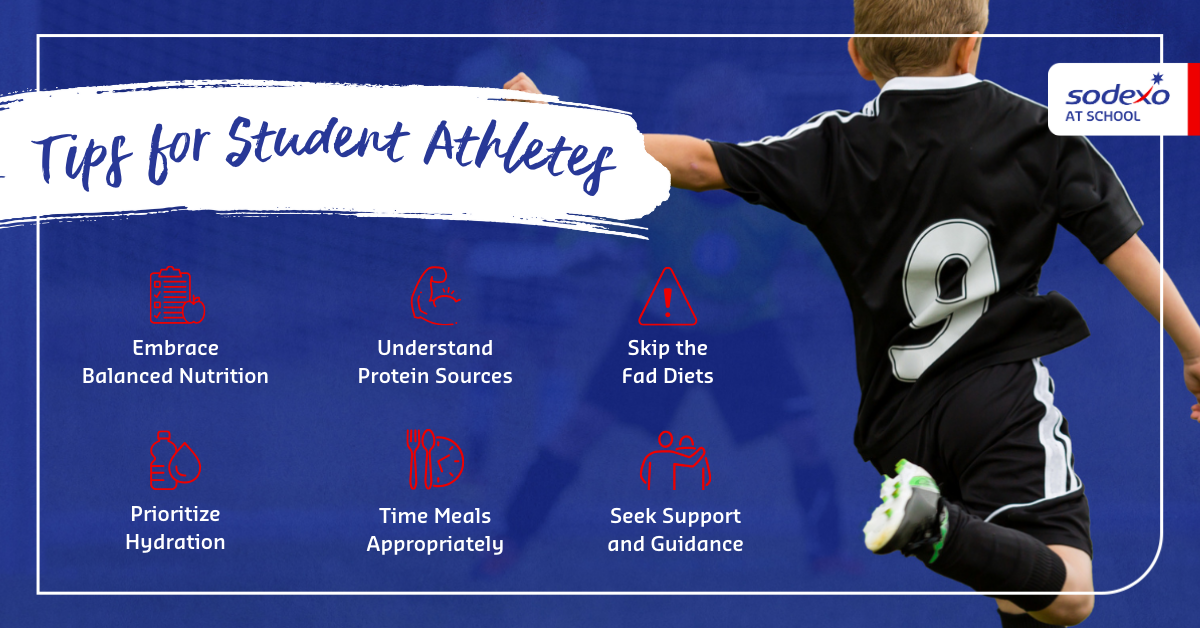As a dedicated schools dietitian, ensuring our young athletes understand the nutrition they need to thrive both academically and athletically is not just a priority but a passion. While we strive to provide students with balanced meals that fuel their growing bodies and active lifestyles, student athletes definitely have unique nutritional needs. While Sodexo works diligently to ensure all students receive adequate nutrition throughout the day, it's crucial for young athletes to understand how to select balanced meals that fuel both their bodies and their athletic endeavors. In this guide, we'll explore six essential tips you can share with student athletes to help them make nutritious choices, supporting their growth and performance on and off the field.
Embrace Balanced Nutrition
Encourage student athletes to view food as fuel for both their bodies and their performance. Instead of focusing on restrictive diets or trendy eating patterns, emphasize the importance of balanced nutrition. Encourage them to include a variety of nutrient-dense options in their meals, such as fresh fruits, leafy greens, vegetables, lean proteins and healthy carbohydrates. By providing their bodies with the necessary nutrients, we not only support their physical performance but also support their growth, recovery and overall well-being.
Prioritize Hydration
One of the most overlooked aspects of sports nutrition is hydration. Proper hydration is essential for optimal performance and overall health. Encourage students to drink water regularly throughout the day, especially before, during, and after exercise. Remind them that dehydration can not only impair performance, but also increase the risk of injuries, cramps and heat-related illnesses. Carrying a water bottle with them can help them make hydrating a habit both on and off the field.
Understand Protein Sources
Protein is essential for muscle repair and growth – and it doesn't have to come exclusively from animal sources! Creating a balanced diet that incorporates a mix of animal and plant-based proteins is a great way to support their athletic performance. Plant-based proteins, such as beans, lentils and tofu are excellent meat alternatives that offer numerous health benefits, including fiber and antioxidants. By diversifying protein sources, young athletes can meet their nutritional needs sustainably while supporting their athletic endeavors.
Time Meals Appropriately
The timing of meals and snacks can significantly influence athletic performance and recovery. Encourage young athletes to approach meal timing strategically, aiming to consume a balanced combination of carbohydrates and protein approximately 2-3 hours before exercise. This pre-workout fuel provides sustained energy to power through training sessions or competitions effectively. Similarly, post-exercise nutrition plays a crucial role in facilitating muscle recovery and replenishing glycogen stores. Encourage athletes to refuel with a mix of carbohydrates and protein within the post-workout window to optimize recovery and prepare for future training sessions.
Skip the Fad Diets
In a culture cluttered with fad diets and quick-fix solutions, it's imperative to steer young athletes away from restrictive eating patterns. Diets that vilify entire food groups or promote extreme calorie restrictions not only undermine athletic performance but also jeopardize long-term health and well-being. These kinds of diets are not only unsustainable, but are also not scientifically sound. Instead, promote a balanced approach to nutrition that emphasizes whole, minimally processed foods. By encouraging students to enjoy a variety of foods in moderation, we can help them develop a healthy relationship with food that fuels their bodies and minds.
Seek Support and Guidance
Empower young athletes to take an active role in their nutrition journey by seeking support and guidance from qualified professionals such as dietitians or nutritionists. These experts can provide personalized recommendations based on individual needs, preferences, and goals. As we celebrate National Nutrition Month and National Dietitian Day, let’s encourage our young athletes to ask questions, seek clarification and actively engage in conversations about their nutrition. Additionally, remind students that it's okay to ask questions and seek help when needed and empower them to take an active role in their own nutrition.
Supporting student athletes' nutritional needs goes beyond simply providing meals – it also requires education, guidance and support. That’s why it’s important to view sports nutrition for kids as not only about fueling athletic performance, but also about nurturing healthy habits that will last a lifetime. As we continue to prioritize the health and well-being of our young athletes, let's empower them with wholesome, delicious food so they can fuel their bodies for success on and off the field!


